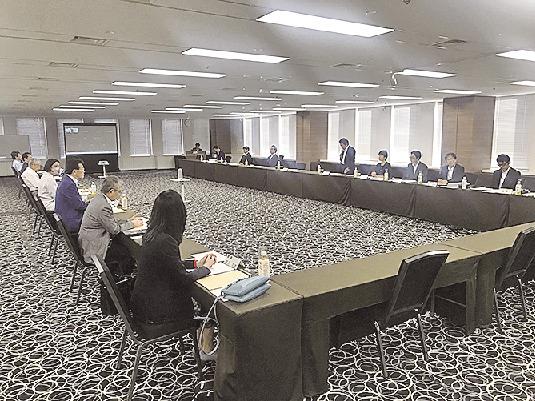Vào ngày 9, chính phủ đã tổ chức cuộc họp với Hội đồng thúc đẩy khả năng phục hồi quốc gia của Ban Thư ký Nội các (do Kiyoshi Kobayashi, giáo sư danh dự của Đại học Kyoto chủ trì) và bắt đầu xem xét toàn diện về kế hoạch trung hạn để thực hiện khả năng phục hồi quốc gia (ảnh). Sau khi đánh giá tác động của ``Các biện pháp tăng tốc 5 năm để ngăn chặn, giảm nhẹ và phục hồi thiên tai'' hiện tại, chúng tôi sẽ quyết định chính sách xây dựng kế hoạch. Hội đồng sẽ lắng nghe ý kiến của chính quyền địa phương và các bên khác và biên soạn dự thảo đề xuất. Kế hoạch này sẽ được thảo luận tại Trụ sở Xúc tiến Phục hồi Quốc gia, do Thủ tướng đứng đầu và được Nội các phê duyệt.

Khoảng 15 nghìn tỷ yên sẽ được đầu tư vào các biện pháp tăng tốc trong 5 năm từ 2021 đến 2025. Kế hoạch này sẽ trở thành kế hoạch theo luật định dựa trên Đạo luật cơ bản về khả năng phục hồi quốc gia và sẽ là kế hoạch kế thừa cho các Biện pháp tăng tốc. Kế hoạch xác định thời gian, nội dung các biện pháp, mục tiêu và quy mô của dự án. Trong Chính sách cơ bản về quản lý và cải cách kinh tế và tài chính năm 2024 (Chính sách cơ bản), chính phủ tuyên bố rằng họ sẽ "tăng tốc tối đa" trong việc xem xét các kế hoạch. Các bộ, cơ quan của Chính phủ đã xác nhận kế hoạch bắt đầu xây dựng đánh giá sau khi tổ chức đánh giá tại cuộc họp liên lạc vào tháng 7.
Mở đầu cuộc họp cùng ngày, Katsuhiko Niwa, Phó Giám đốc Văn phòng Xúc tiến Khả năng Phục hồi Quốc gia của Ban Thư ký Nội các, cho biết: “Chúng ta cần nỗ lực ngăn chặn, giảm nhẹ thiên tai và khả năng phục hồi quốc gia để có thể giảm thiểu thiệt hại do thiên tai quy mô lớn gây ra.” -những thảm họa thiên nhiên quy mô có thể xảy ra bất cứ lúc nào.” ông chỉ ra. Sau đó ông tuyên bố: ``Bắt đầu từ hôm nay, chúng tôi sẽ tiến hành xem xét kế hoạch thực hiện trung hạn.''
Tại cuộc họp, trong quá trình đánh giá các biện pháp tăng tốc 5 năm, đã có cuộc thảo luận về các biện pháp riêng lẻ và tình trạng hợp tác giữa các biện pháp. Trong tương lai, dữ liệu về các biện pháp riêng lẻ sẽ được thu thập từ các bộ, cơ quan và việc đánh giá sẽ được thảo luận tại cùng một cuộc họp.
Về phối hợp giữa các biện pháp đánh giá, việc đánh giá sẽ được xem xét từ ba thay đổi: lực lượng/kháng cự thiên tai bên ngoài, điều kiện xã hội và môi trường thực hiện dự án. Việc đánh giá có tính đến sự suy giảm khả năng chống chịu thiên tai của cơ sở hạ tầng (đang già đi), suy giảm dân số, thiếu nguồn nhân lực, nỗ lực của các bộ và cơ quan bao gồm "Dự án kiểm soát lũ lưu vực 2.0" của Bộ Đất đai, Cơ sở hạ tầng, Giao thông và Du lịch và bài học rút ra từ trận động đất ở bán đảo Noto dự kiến sẽ được thực hiện.
Tại cuộc họp, quyền chủ tịch Nobuo Fukuwa (giáo sư danh dự tại Đại học Nagoya) đã chỉ ra rằng có sự chậm trễ trong việc xây dựng các tòa nhà chống động đất do thiệt hại do trận động đất ở bán đảo Noto gây ra, đồng thời bày tỏ quan điểm rằng cần có một “cơ chế riêng” -dẫn đầu (đánh giá) thể loại.''
Mời các đối tác xem hoạt động của Công ty TNHH Pacific Group.
FanPage: https://www.facebook.com/Pacific-Group
YouTube: https://www.youtube.com/@PacificGroupCoLt






